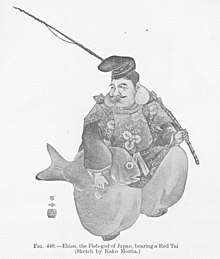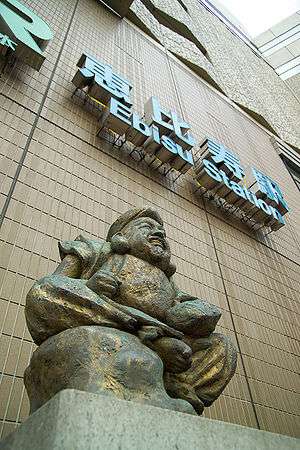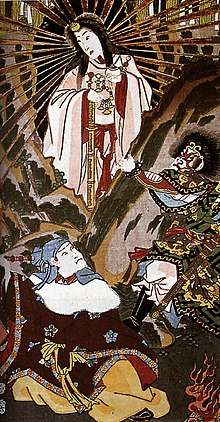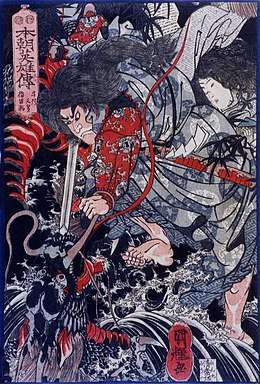Ebisu (mythology)
Ebisu (恵比須, 恵比寿, 夷, 戎), also transliterated Webisu (ゑびす, see historical kana orthography) or called Hiruko (蛭子) or Kotoshiro-nushi-no-kami (事代主神), is the Japanese god of fishermen and luck. He is one of the Seven Gods of Fortune (七福神, Shichifukujin), and the only one of the seven to originate purely from Japan without any Hindu influence.
| Ebisu | |
|---|---|
Water, Fisheries, Business, Wealthness | |
| Member of Seven Gods of Fortune | |
 | |
| Other names | Hiruko |
| Animals | Fish "Ebisu Dai" |
| Gender | Male |
| Region | Mainly Kansai |
| Ethnic group | Japanese |
| Parents | Izanagi and Izanami |
Origins as Hiruko
In medieval times, Ebisu's origin came to be tied together with that of Hiruko - the first child of Izanagi and Izanami, born without bones (or, in some stories, without arms and legs) due to his mother's transgression during the marriage ritual. Hiruko struggled to survive but, as he could not stand, he was cast into the sea in a boat of reeds before his third birthday.[1] The story tells that Hiruko eventually washed ashore—possibly in Ezo (蝦夷, ancient Hokkaidō)—and was cared for by the Ainu Ebisu Saburo (戎三郎). It is however believed that Ebisu first arose as a god among fishermen and that his origin as Hiruko was a much later conception, after the worship of him had spread to merchants and farmers.[2] It is also theorized that he was originally a god known as "Kotoronushi no Mikoto", son of Ōkuninushi.[3] He became one of the shichifukujin or the seven gods of fortune, which include Daikokuten, Bishamon, Benzaiten, Fukurokuju, Jurojin, and Hotei.[4] Ebisu, together with Daikokuten, was considered the most popular of these seven and was venerated in almost every Japanese home.[4]
For some communities, in addition for being a deity of fishing, wealth, and fortune, Ebisu is also associated with objects that would drift ashore from the sea such as logs and even corpses.[5] As part of the shichifukujin, Ebisu has three sets of temples and shrines in Tokyo, the Mukojima, Yamate (Bluff), and Meguro sets.[4]
Legend

The weak child overcame many hardships, grew legs (and, presumably, the rest of his skeletal structure) at the age of three, and became the god Ebisu. He remains slightly crippled and deaf, but mirthful and auspicious nonetheless (hence the title, "The laughing god"). He is often depicted wearing a tall hat—the Kazaori Eboshi (風折烏帽子)—holding a rod and a large red sea bream or sea bass. Jellyfish are also associated with the god and the fugu restaurants of Japan will often incorporate Ebisu in their motif.
Cultural relevance
Ebisu's festival is celebrated on the twentieth day of the tenth month, Kannazuki (the month without gods). While the other myriad members of the Japanese pantheon gather at The Grand Shrine of Izumo, Ebisu does not hear the summons and is thus still available for worship.
Ebisu is frequently paired with Daikokuten, another of the seven gods of Fortune, in displays of the twin patrons by small shopkeepers. In some versions of the myth they are father and son (or master and apprentice). Also, these two are often joined by Fukurokuju as the "Three Gods of Good Fortune".
As a form of animal worshipping, Ebisu was often associated with marine megafauna such as whales and whale sharks (hence the latter being called the "Ebisu-Shark") that bring in masses of fish and protect fishermen.[6][7]
Ebisu is depicted or parodied in a wide range of media, from artwork to costumed impersonations at local festivals and in commercial logos and advertisements. One of the most widely recognized product logos is in association with Yebisu beer, which was first brewed in 1890, and is currently brewed by Sapporo Brewery.
Ebisu is the basis of the name of the clothing brand Evisu.
References
- B.H. Chamberlain, translator (1882). "Kojiki". Retrieved 2006-09-09.
- Garcia, Hector (2012). Geek in Japan: Discovering the Land of Manga, Anime, Zen, and the Tea Ceremony. Tuttle Publishing. p. 55. ISBN 978-1-4629-0629-1.
- Encyclopedia Nipponica (Shogakukan): "えびす"
- De Garis, Frederick; Sakai, Atsuharu (2009). We Japanese. Oxon: Routledge. p. 502. ISBN 0710307195.
- Rambelli, Fabio (2018). The Sea and the Sacred in Japan: Aspects of Maritime Religion. London: Bloomsbury Publishing. p. 191. ISBN 978-1-350-06285-6.
- 村上健司 編著 (2005). 日本妖怪大事典. Kwai books. 角川書店. p. 182. ISBN 978-4-04-883926-6.
- 大藤時彦他 (1955). 民俗学研究所編 (ed.). 綜合日本民俗語彙. 第2巻. 柳田國男 監修. 平凡社. p. 763.
External links


